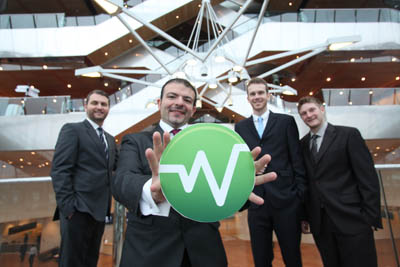Prof Brian Glennon and Dr Mark Barrett, co-founders, APC. The company is now hiring staff
Five new start-ups spun out of research programmes at University College Dublin in 2011 are aiming to take on a combined 50 new hires by the end of 2013. All five ventures are now based at NovaUCD.
In the past five years, 19 spin-outs have been spawned from UCD research.
The five ventures have all completed the NovaUCD Campus Company Development Programme. Currently, 37 high-tech and knowledge-intensive companies, employing more than 200 people, are based at NovaUCD.
The five spin-outs are planning to employ in excess of 50 people by the end of 2013, UCD announced today. So what are the ventures all about?
We recently profiled Wattics, a start-up aiming to be a game changer in the energy-management sector. The company has developed a smart-metering solution to help firms manage their energy data and reduce the charges on their electricity bills. It is also vying for an R&D award in the 2012 Irish Times InterTradeIreland Innovation Awards, being up against Cellix and X-Bolt Orthopaedics.
One of Wattics’ co-founders, Anthony Schoofs, has already been in the global innovation limelight. Last year, he won the Globe Sustainability Research Award in recognition of his contribution to sustainability research via his PhD.

Members of the Wattics team. (From left) Seamus Porter, sales director; Dr Antonio Ruzzelli, CEO; Anthony Schoofs, CTO; and Alex Sintoni, head of engineering
Next up is APC, a start-up we profiled back in November when it won the NovaUCD 2011 Start-Up Award. Co-founded by Prof Brian Glennon and Dr Mark Barrett as a spin-out from UCD’s School of Chemical and Bioprocess Engineering, the company provides pharmaceutical processing technologies and customised solutions to global pharmaceutical companies. The start-up has already hired five permanent PhD qualified engineers and chemists. It says it is now recruiting highly skilled staff for its technology divisions.
Clean-tech start-up Belfield Technologies has developed a technology called HIDLightSaver. The application aims to help organisations reduce their energy costs and carbon footprints for street light, floodlit arenas, motorways and retail outlets. Dr Ger Devlin, Dr Kevin McDonnell and David Meagan co-founded Belfield Technologies as a spin-out from UCD’s School of Biosystems Engineering.
Targeting the construction industry, Building Risk Assessment & Management (BRAM) Consulting Engineers provides risk assessment and risk-management services for existing buildings during adjacent construction or industrial activities.
Dr Debra Laefer, Dr Linh Truong-Hong and Julie Clarke co-founded BRAM as a spin-out from UCD’s School of Civil, Structural and Environmental Engineering.
The firm is also developing associated software for converting remote sensing data into reconstructed building models.
Finally, New Lambda Technologies is delving into the provision of extreme ultra violet light sources and optics to the semiconductor industry for next-generation chips. Dr Kenneth Fahy, Dr Fergal O’Reilly, Paul Sheridan and Prof Padraig Dunne are co-founders of the venture, spun out from UCD’s School of Physics.
UCD also indicated today that UCD researchers generated 44 new inventions during 2011.
Smart economy and start-ups
Commenting on the announcement of UCD’s commercialisation results for 2011, Prof Peter Clinch, vice-president for Innovation at UCD, spoke about the development of a sustainable smart economy in Ireland. He said Ireland needs “a strong flow of innovative ideas and high-tech start-up companies”.
“These start-ups will grow and develop in the coming years which will generate highly-skilled job opportunities,” added Clinch.